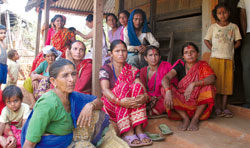|
|
In 2002, Nepal's parliament passed a bill to allow women to inherit property at birth. The same year, a new law decriminalising abortion came into effect. Earlier this year, the Supreme Court scrapped the law that allowed men to seek divorce if their partner was infertile.
Then on Tuesday the parliament unanimously passed a proposal that says Nepalis can be citizens based on a mother's citizenship.
Great victories all, but activists say there are still lots of other discriminatory laws and the real test will be in implementation of the ones that have been passed.
The Forum for Women Law and Development (FWLD) there are still 173 provisions and 102 schedules in 83 laws that discriminate against women on issues ranging from property, marriage and family, nationality and legal and court proceedings to trafficking and sexual abuse, employment and education. In addition, even after their historical contribution in the April Uprising women are still discriminated against at policy-making levels. For example, no women are on the current government-Maoist talks teams and there is only one token woman in the new cabinet.
"It has to do with the feudal patriarchal thinking that our society still suffers from," says Sahana Pradhan of the UML, "why do Nepali women have to ask for what is rightly theirs? The answer is simple: Nepali men refuse to admit that women can do a good job."
Although the constitution guarantees non-discrimination, the document itself explicitly discriminates against women. With the Eleventh Amendment to the Muluki Ain, daughters are by birth recognised as co-partners in ancestral property but the right is limited. Upon marriage, they have to return their property to the maternal family but sons face no such limitations.
"Any discrimination based on sex as a consequence of law made by the state itself is a gross violation of basic human rights," says Sapana Pradhan Malla of FWLD. Even when laws could empower women, often women are unaware of them. Rita Tandukar, 27, of Kathmandu filed for divorce from her husband of 10 years and is asking for recognition of her right to property and a living allowance. "Had I known that there are provisions where women can file cases against their husbands, I would have done so earlier instead of tolerating all these years," Tandukar says.
Experts agree that courts are doing a commendable job in changing laws in response to public-interest litigation or government intervention, but that has still not improved the lives of many women.
Although abortion was legalised in 2002 women can still be charged with infanticide and jailed. Changing that law did not bring about the desired results because authorities did not think about providing additional services or educating women about the change.
"How many people in rural Nepal know abortion has been legalised? How many women in these places know where to go for safe and affordable services?" asks Malla.
Sahana Pradhan thinks that the House's adoption of the citizenship proposal was a great victory but she is wary about its implementation. "It is not a big deal to be a party to international conventions or to pass laws, it is how they are put into practice that matters," she says.
Activists are also excited by the house decision Tuesday to reserve 33 percent of seats in all state offices for women. "Do your math-of the 205 members of parliament, 68 are going to be women. Imagine the kind of difference these women will make," Pradhan told us.
But Ashtha Laxmi Shakya, former Minister of Women, Children and Social Welfare is not satisfied with 33 percent: "Our new demand is for 50 percent seats to be reserved for women."
Minister of Women Children and Social Welfare Urmila Aryal says the hopes of 1990 were dashed because there was no coordination between government and women's organisation. She says: "Let's work to remedy that so we don't repeat the same mistakes again."



